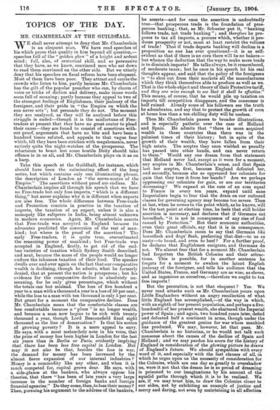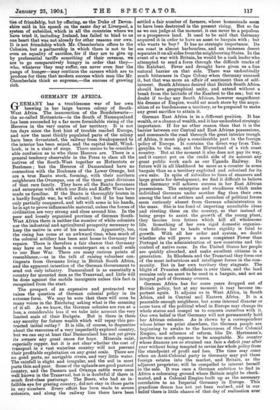MR. CHAMBERLAIN AT THE GUILD}TALT, which, till they have been
stricken with megalomania, never entirely quits the night-watches of the prosperous. The reluctance to boast lest some hostile Deity should take offence is in us all, and Mr. Chamberlain plays on it as on a harp.
Take this speech at the Guildhall, for instance, which should have been the culminating effort of the long series, but which contains only one illuminating phrase, the description of London as "the nerve-centre of the Empire." The assertions without proof are endless. Mr. Chamberlain implies all through his speech that we have no Free-trade but only free imports, "which is a different thing," but never explains why it is different when exports are also free. The whole difference between Free-trade and Protection consists in practice in the taxation of imports, the taxation of an export, unless it is also a monopoly like saltpetre in India, being almost unknown in modern economics. Again, Mr. Chamberlain asserts that Free-trade was accepted in England because its advocates predicted the conversion of the rest of man- kind; but where is the proof of the assertion ? The early. Free-traders, it is quite true, overestimated the reasoning power of mankind ; but Free-trade was accepted. in England, firstly, to get rid of the end- less varieties of taxation which Sydney Smith described, and next, because the mass of the people would no longer endure the inhuman taxation of their food. The speaker dwells over and over again on the fact that our comparative wealth is declining, though he admits, what he formerly denied, that at present the nation is prosperous ; but his evidence for the comparative decline is absolutely un- meaning, for he only gives percentages, which without the totals can but mislead. The loss of five hundred a year to a man with a thousand a year is a loss of 50 per cent., while the loss to a man with ten thousand is only 5 per cent. But grant for a moment the comparative decline. Does Mr. Chamberlain mean that the comfortable classes are less comfortable because a "plum " is no longer wealth, and. because a man now begins to be rich with twenty thousand a year, though Lord Beaconsfield fixed eight thousand as the line of demarcation ? Is that his notion of growing poverty? It is a mere appeal to envy. He says, with a most melancholy note in his voice, that the price of money has been higher in London for the last six years than in Berlin or Paris, evidently implying that there has been less free capital in London. But may it not also be that, besides the loss in war, the demand for money has been increased by the, almost fierce expansion of our internal industries? Money is a commodity like any other, and when it is lunch competed for, capital grows dear. He says, with a side-glance at the bankers, who always oppose his theories, that there "has been of late years a very large increase in the number of foreign banks and foreign financial agencies." Do they come, then, to lose their money? Then, pursuing his argument to the address of the bp.nkers, he asserts—and for once the assertion is undoubtedly true—that prosperous trade is the foundation of pros- perous banking; that, as Mr. Schuster put it, "banking follows trade, not trade banking " ; and therefore he pro. poses to tax all imports, a process which, whether it pro- duces prosperity or not, must at least restrict the volume of trade ! That if trade departs banking will decline is .a proposition no one has ever questioned—it is as self-' evident as that if there is no corn there will be no bikers— but whence the deduction that the way to make more trade is to diminish imports? He talks always, be it remembered, of moderate taxes ; but he once in his speech let his real thoughts appear, and said that the policy of the foreigners is "to shut out from their Markets all the Manufactures - which they think themselves able to produce as well as we. That is the whole object and theory of their Protective tariff, and they are wise enough to see that it shall be elective." This means, of course, that he would pile up taxation on imports till competition disappears, and the consumer is half ruined. Already some of his followers see the truth he adumbrates, and say that to protect the growth of corn .. at home less than a ten-shilling duty will be useless.
Then Mr.' Chamberlain passes to broader illustrations, and is especially pathetic over the case of Holland and Spain. He admits that "there is more acquired wealth in those countries than there was in the palmiest times of their history ; but in spite of the growth of their wealth, they have fallen from their high estate. • The sceptre they once wielded so proudly has passed into other hands, and can never return to them." Would any one dream from that statement that Holland never had, except as it were for a moment, any sceptre in Mr. Chamberlain's sense, and that Spain lost her sceptre, first, because England defeated her, and secondly, because she so oppressed. her colonists for gain that they tore it from her hands ? Are we perhaps oppressing our colonists for gain, or are our territories decreasing ? We expand at the rate of an area equal to France in every ten years, expand until sane Imperialists begin to fear that the drain on our cultured classes for governing agency may become too severe. Then at last, when he comes to the point which, as he knows, will be the test point at election time, he feels that still bolder assertion, is necessary, and declares that if Germans eat horseflesh, "it is not in consequence of any rise of food caused by Protection." But their economic authorities, even their great officials, say that it is in consequence; Does Mr. Chamberlain mean to say that Germans like horseflesh and doge' flesh, preferring that diet—to us so nasty—to bread, and even to beef ? For a further proof, he declares that. Englishmen emigrate, and Germans do not. We almost fear that for a moment Mr. Chamberlain had forgotten the British Colonies and their attrac- tions. This is possible, for in another sentence he forgets for a moment to awaken the latent English jealousy of the foreigner, and tells his audience that the United States, France, and Germany are as wise, as clever, and as ingenious as ourselves,—therefore we ought to tax free imports !
But the peroration, is not that eloquent ? Yes. We never read attacks such as Mr. Chamberlain pours upon Little Englanders without an angry recollection of what little England has accomplished,—of the way in which, with an eighth of her present population, and perhaps a five- hundredth of her present wealth, she shattered the Imperial power of Spain ; and again, two hundred years later, defied and defeated half a continent in arms, though under the guidance of the greatest genius for war whom mankind has produced. We may, however, let that pass. Mr. Chamberlain is no historian, or he would not talk such nonsense about the causes of the decline of Spain and Holland ; and we may pardon his scorn for the history of England in consideration of the glowing picture he draws of England's future. We should sympathise with every word of it, and _especially with the last clauses of all, in which he urges upon us the necessity of consideration for the Colonies, which are one day so greatly to overshadow us, were it not that the dream he is so proud of dreaming is poisened to our imaginations by his account of the squalid paths through which it is to be realised. We are, if we may trust him, to draw the Colonies closer to our sides, not by exhibiting an example of justice and mercy and daring, not even by maintaining in all affection ties of friendship, but by offering, as the Duke of Devon- shire said in his speech on the same day at Liverpool, a system of subsidies, which in all the countries where we have tried it, including Ireland, has failed to bind to us one heart that was not already for other reasons our own. It is not friendship which Mr. Chamberlain offers to the Colonies, but a partnership in which there is not to be even an equality of sacrifice, for if they are to give up by preferential tariffs something of their revenue, we are to go comparatively hungry in order that they— who, whatever they may suffer, can never even fear the pangs of hunger—may continue the careers which are to produce for them that modern success which men like Mr. Chamberlain think so supreme,—the success of growing rich.











































 Previous page
Previous page